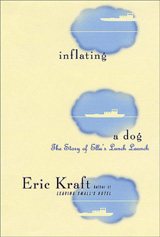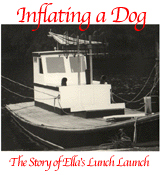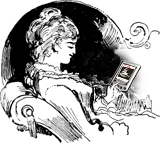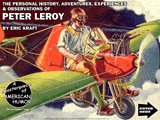

YOU CAN READ
THE FIRST HALF OF THE BOOK
HERE,
ONLINE, ONSCREEN,
OR
YOU CAN ORDER THE
PICADOR USA EDITION
AT
AMAZON.COM
OR
BARNES&NOBLE.COM
OR
YOU CAN DOWNLOAD
THE COMPLETE TEXT
AS AN eBOOK
AND
READ IT IN BED
OR
YOU CAN ORDER THE
AUDIO
BOOK
AND LISTEN
TO KRAFT READING
THE COMPLETE TEXT
TO YOU.

eBOOK
PAGE

CHAPTER
27 SAMPLE
AUDIO
BOOKS PAGE
|
Chapter 27
A Quiet Family Dinner, On the Eve
 N
THE EVE of our taking possession of Arcinella, a few minutes before
my father was likely to arrive home from work, I was upstairs in my room,
idly jotting lines for potential doo-wop songs, trying for ones that rhymed
with Patti (drives me batty, is no fatty, sure ain’t catty, dresses natty),
when I smelled smoke. I went downstairs. My mother was in the
kitchen, trying to make dinner. N
THE EVE of our taking possession of Arcinella, a few minutes before
my father was likely to arrive home from work, I was upstairs in my room,
idly jotting lines for potential doo-wop songs, trying for ones that rhymed
with Patti (drives me batty, is no fatty, sure ain’t catty, dresses natty),
when I smelled smoke. I went downstairs. My mother was in the
kitchen, trying to make dinner.
“What happened?” I asked.
“Oh, Peter, ” she said, “I’m a wreck. Look
at this mess.” In the iron frying pan on the stove there were some
crab cakes. From the top, they didn’t look bad, but then Arcinella
didn’t look bad from the top either, and I was just about eighteen hours
away from discovering that a boat, like a crab cake, could look just fine
from the top and be damaged beyond repair on the bottom. My mother
forced a spatula under one of the cakes, struggling to free it from the
pan, pushing, pushing, in stuttering thrusts, to get the blade beneath
the cake, and when she had it loose at last she raised it gingerly, like
a poor dead thing. The undercrust was thick and black, as hard and
smooth as the venerable seasoned pan. I was disappointed; I liked
crab cakes. They were a family favorite; sometimes we had them with
spaghetti, and sometimes we had them with poached eggs on top and hash-browned
potatoes on the side, which was the way I liked them best.
“Were you going to have them with poached eggs?”
I asked.
“Yes,” sighed my mother, and she tousled my hair
to salve my disappointment. “I wanted something easy—something I
could make without thinking, you know?”
I did know. I’d seen her cook without thinking;
I sometimes did my homework that way. There were certain dishes that
she made as if she were not there, as if she had drifted on a fair breeze
to somewhere else and left an hourly employee behind to mix the crab and
onions into the batter, shape the patties, and brown them till they were
crisp and golden while she was someplace else where she was not required
to cook.
“But I got—distracted.” She indicated a pad
of paper and a list of things to be done after we took possession of the
boat in the morning, and I understood that she’d been visiting the future,
the place where our hopes take us, and had let tomorrow distract her from
today.
“Couldn’t you take the burned part off?” I suggested.
She frowned and regarded the crab cakes doubtfully.
“He always puts ketchup on crab cakes,” I noted
helpfully, as a good sidekick should.
She burst out laughing. We both understood
that the only reason the burnt crust on the crab cakes mattered was that
my father wouldn’t like it. She and I were both more interested in
the boat; we had to give him something to eat to keep him quiet while we
talked about it.
She hugged me.
“Clamburgers?” I suggested.
“Mm, we did that,” she said.
“Yeah, he’d smell a rat. We need something
different, like—”
“Hamburgers!”
“Yeah. That’ll do it.”
She grabbed her pocketbook. “Get some hamburgers,
with the works, and french fries, and strawberry shortcake.” She
opened her pocketbook and hesitated for just a moment. Then she pulled
out the envelope that held the financing for her elegant excursions.
“Expenses,” she said. “Business expenses.”
We heard the crunch of tires in the driveway, and
my mother began scraping the crab cakes into the garbage. “Go on,”
she said. “Scoot.”
I was going out as my father was coming in, and
before I shut the door, I heard my mother exclaim, “Oh, Bert! You’re
home! Why don’t you make us a couple of old-fashioneds?”
I walked north, up our street, toward the Straight
Line Highway, four lanes of concrete that split Long Island lengthwise
like a filleted flounder. When I got to the corner where our street
was broken by the highway, I could see the metal cladding of the Night-and-Day
Diner gleaming in the evening sunlight, as flashy as the chrome grin on
one of that year’s finny cars. To get to the diner, I had to cross
the highway, and the designers of the highway had made no provision to
assist the pedestrian in this endeavor. They had apparently assumed
that no one would cross the highway on foot, but those of us who lived
near it often did so, perilous though the crossing was, because we still
had friends and even relatives across the divide and weren’t willing to
stop visiting them just because the journey had been made artificially
difficult. (In time, the highway became a greater divide, wider,
running far more swiftly, and effected or completed another socioeconomic
partition in the town, demarcating, like a contour line on a topographic
map, a small but significant difference in elevation between the lower-middle-class
families who bought the cheap little houses just south of the highway and
the upper-working-class families who bought the cheaper little houses just
north of the highway and a level lower on the social slope.) The
fact that I had to do a little car-dodging always made the trip to the
Night-and-Day seem like an adventure; it made the buying of hamburgers
more like the hunting of a mammoth, the responsibility of getting them
home without dropping them in the gutter more like the responsibility of
feeding a family wholly dependent on me, waiting for me back in the damp
and drafty cave, where they huddled in darkness, cold, frightened, frail,
and desperate; it was the testing sort of labor that a stalwart sidekick
ought to be assigned, and I made the most of the drama in it, darting and
dashing across the traffic in a daredevil manner that wasn’t really necessary,
since most of the drivers of that time didn’t go very fast, and would actually
have slowed to allow a boy such as me to cross if I had stood meekly at
the roadside and beseeched them with a look, something that, at my important
age, I could not have allowed myself to do.
Safely across the highway, I ran through the parking
lot, swung the door open, and stepped into the bright fluorescent light
of the Night-and-Day. I loved the place, and I particularly loved
the moment of entry. Now, right now, sitting here in Manhattan,
I can feel the pressure of my palm against the cool door, feel the door
yield, and at once I can smell onions frying.
Leon, the short-order cook, shot me a look, grinned,
and nodded a greeting. Leon had a talent that I admired and wished
that I, and my mother, possessed: he could keep stirring the onions on
the griddle and even flip a burger while talking to someone at the counter;
that wasn’t the talent, of course, merely a single manifestation of it;
the talent was for doing more than one thing at once.
“My little man,” he said, “how are you doing this
evening?”
“I’m just fine,” I said. “You?”
“Hm,” he said, and he paused to consider the question.
After due consideration, he said, “I’m getting along adequately well, thank
you. What can I get for you this evening?”
I gave my order carefully and precisely: four hamburgers,
two of them rare, two medium-rare, all with fried onions; two large orders
of french fries; a medium order of cole slaw; and three strawberry shortcakes.
Leon shoveled some chopped onions from the pile that was always ready in
a rear corner of the griddle, partially cooked, glistening, sizzling, guaranteeing
that the pungent aroma of the Night-and-Day would accompany the diners
when they departed, lodged in their coats and sweaters and hair
“You want anything else on those burgers, Sport?”
he asked, and then swung right into the list he liked to rattle off, “Cheese?
Lettuce? Tomato? Fried peppers? Relish? Ketchup? Pickles? Chow-chow? Sprinkles?
Chopped nuts? Whipped cream? A cherry?” Usually, he continued through
a list of pizza toppings, from anchovies to pepperoni, but this time he
raised a hand to stop himself, and me if I had intended to join in, and
said, “Uh-oh, now we have got to hush up and listen, because that’s my
man Rolly Dunham coming on the radio.” It was the Rolly Dunham Quartet:
piano, bass, drums, and Dunham on the tenor sax. He was playing a
solo, and its effect was immediate. It lifted me. It transported
me. I could feel myself growing larger and lighter. He was
playing a version of a tune that I didn’t recognize, but one that I would
never forget, and even now when I hear it the sound of Dunham’s saxophone
seems to hold within it the thick, earthy aroma of hot fat and fried onions.
When the song ended, I was still floating. Dunham was a master of
inflation.
Leon went back to his work at the griddle, but he
kept shaking his head as if what we had heard could not have been real.
“Oh, man,” he said, “did you hear that cat blow?”
“I did,” I said.
“I tell you,” said Leon with another incredulous
shake of the head, “that cat could inflate a dog.”
He probably could have. He was a gas tank,
a dispenser of lifting gas, a madman of the very first rank. His
music was a gas, and he was a gasser, and I was a convert. Doo-wop
might have had the power to float bright iridescent bubbles on a summer
breeze, but jazz could do some heavy lifting; like hydrogen and hot air
combined, it was magical and strong and dangerous, and it blew me up.
WE ATE OUR HAMBURGERS in the living room, at the folding tables, “TV
tables,” that we used when we ate in front of television. My mother
picked at her hamburger, took it apart, put it back together, and passed
it from hand to hand, but ate hardly any of it. When my father and
I had finished, she gave me a look, and I followed her to the kitchen.
She lit a cigarette and puffed at it nervously. Together, we read
again and again the list of things to be done the next day and the supplies
that we had to be sure to have with us, planning the work and our assignments,
and when we had done everything that we could do without being down on
the Bolotomy, on board Arcinella, she said, “We’ve got to get a
really early start.”
“I know,” I said.
“Do you think Patti will be ready?”
“Sure she will.”
“I hope so.”
A moment of silence. In that moment, an idea
occurred to me; perhaps it would be better, more honest, to say that a
desire overcame me.
“I wonder,” I said, attempting an attitude of cool
indifference to the reception that my mother might accord the proposal
I was about to make, “if Patti should spend the night here—you know—so
that we could all get up and get going as early as possible.”
Another moment of silence. My mother was considering
the idea. For this moment, this brief exhilarating moment, I was
able to believe that Patti Fiorenza might actually spend the night in my
house.
Perhaps my mother was able to hear my heart pumping
hot blood at a rapid rate, because she looked at me and rolled her eyes
and almost laughed.
“Just an idea,” I said, though we both knew that
it had been more than that. With a sheepish grin I said, “Well, I’d
better get some sleep,” and I went up to bed.
|
|

 Here
are a couple of swell ideas from Eric Kraft's vivacious publicist, Candi
Lee Manning.
Here
are a couple of swell ideas from Eric Kraft's vivacious publicist, Candi
Lee Manning.




